Covid-19 conspiracists conspire against fact-checkers
Conspiracy peddlers attack Latvian fact-checking outlet
Covid-19 conspiracists conspire against fact-checkers
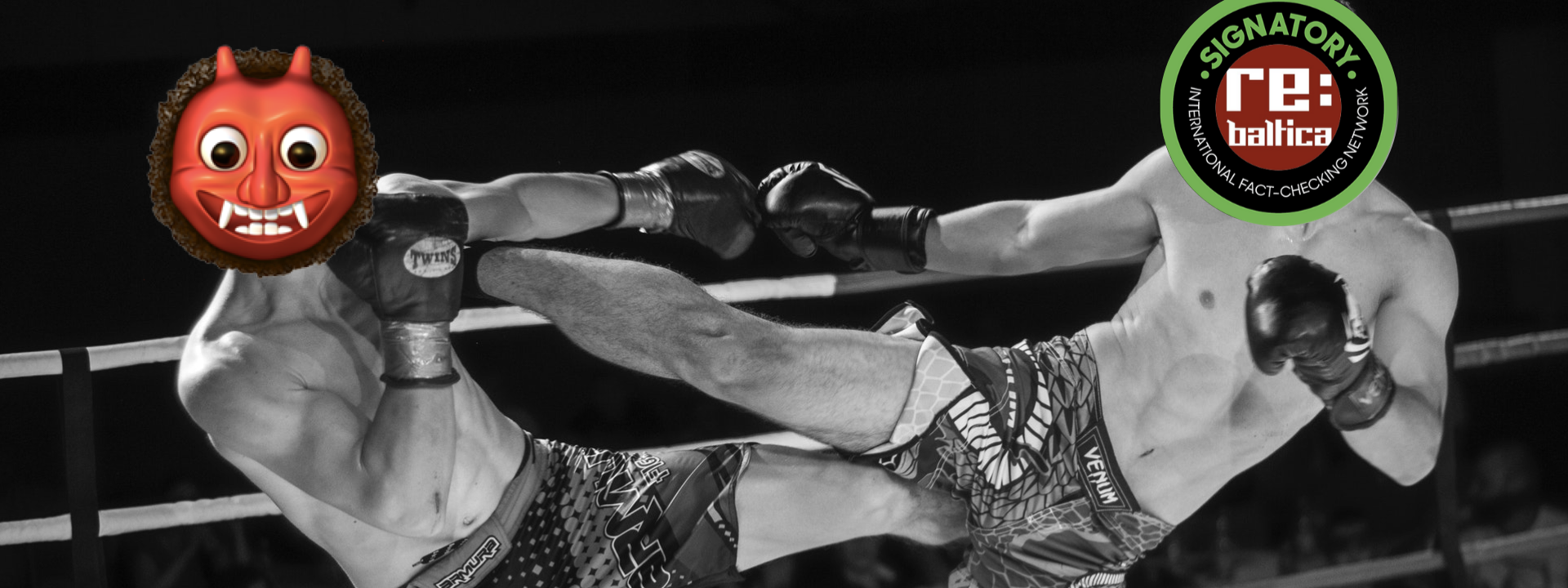
Conspiracy peddlers attack Latvian fact-checking outlet for debunking their claims

At least seven mutually independent authors of COVID-19 disinformation aligned together to smear Re:Check, a Facebook certified fact-checking project that had previously debunked them. The authors, together with their supporters, started an online petition and produced videos about how to encourage Facebook to terminate its partnership with Re:Check, as well as sharing other disparaging content about the fact-checking project.
The case shows how fact-checkers’ efforts to prevent the spread of disinformation online can be met with resistance, and how Facebook can then turn in a battleground between those who seek to expose disinformation and those who spread it.
Re:Check, a fact-checking organization in Latvia founded by Re:Baltica, The Baltic Center for Investigative Journalism, has been an official Facebook fact-checking partner since March 2020. The partnership allows Re:Check to flag debunked stories on Facebook, which in turn leads the Facebook algorithm to limit the false story’s reach and even prevent the source responsible from monetizing the content.
Facebook has long faced public pressure to curb the spread of disinformation on the platform. Amid the COVID-19 outbreak, the World Health Organization (WHO) declared that the world is facing an infodemic — “an over-abundance of information –some accurate and some not –that makes it hard for people to find trustworthy sources and reliable guidance when they need it.” On March 17, The Poynter Institute’s International Fact-Checking Network (IFCN) and Facebook announced a number of grants allocated to fighting coronavirus misinformation.
Fire and backfire
The day after Re:Baltica’s March 25 announcement of its partnership with Facebook, Andris Ciekurs, an owner of a Facebook page called Gaismas Timeklis, (“Net of Light”), which offers esoteric consultations and therapy, started a petition to terminate Re:Baltica’s official Facebook fact-checker status. The petition claimed that Re:Check “violates freedom of speech.”
At least 22 other Facebook pages and groups amplified the petition (some on several occasions), according to CrowdTangle data.
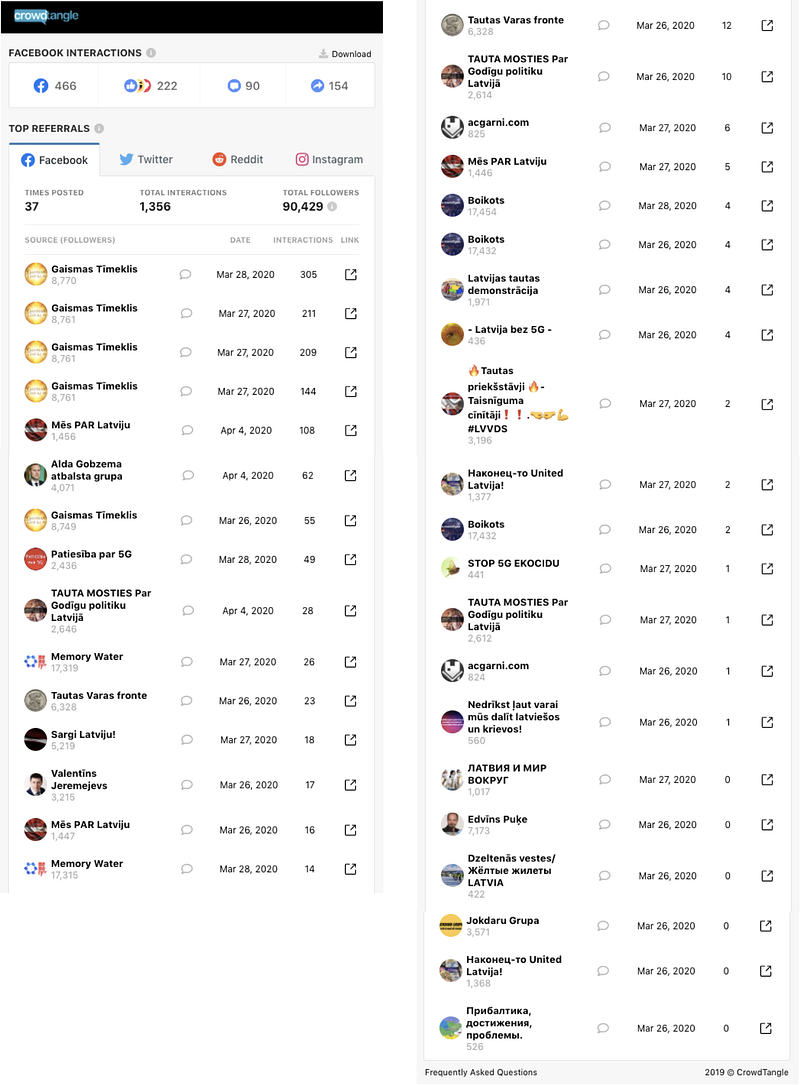
Since March 13, Re:Check has debunked 17 false stories about COVID-19. Most of the Facebook groups and pages that shared the petition were previously caught and debunked by Re:Check.
On March 14, Re:Check debunked a misleading comparison of deaths due to COVID-19 and other diseases shared by a Latvian Facebook page called Tautas Varas Fronte (“The Nation’s Power Front”), which the DFRLab has previously researched in the context of an online boycott of European Parliament elections in 2019. The page belongs to Valentins Jeremejevs, a fringe political activist, and routinely amplifies other fringe opinion leaders, including Roberts Klimovics, Arvis Abramovics, Maris Berzins, and Roberts Raimo.
All of these activists have shared disparaging content about Re:Baltica on their Facebook accounts and pages. “I am against Re:Baltica’s moral fascism,” Jeremejevs wrote. “Let’s gather signatures to submit protest against re:baltica’s inadequate censorship on internet. If it will not help we will submit collective action against re:baltica and Facebook.” Abramovics added, “Libersluts have blocked me on their page! O wow! It looks like trouble!! But never mind, there is a working group and Re:Baltica libersluts will lose control over Facebook content!”

Re:Check has also debunked the Latvia-based conspiracy amplifiers of Kla.tv, an international outlet connected to Organic Christ Generation, a Swiss-based religious sect whose leader has compared Adolf Hitler to Jesus Christ. An anti-vaccination Facebook page called “Vakcinrealitate Latvija” fired back in response to this debunk by producing a smear video about the founder of Re:Baltica, Inga Springe. The video discussed her private life, tied her to billionaire philanthropist and common conspiracy target George Soros, and claimed Kla.tv was a trustworthy source. At least 489 accounts shared the video on Facebook.
Conspiracists unite
Janis Plavins, another creator of conspiracy theories in Latvia and owner of a company called “Memory Water,” posted a video in which he framed COVID-19 as a man-made virus designed as a bioweapon. Re:Check debunked it, and now the video is labeled on Facebook as false. In his reply, Plavins, like Ciekurs, started a campaign against Re:Baltica.
Ciekurs not only made the initial petition, but also refuted Re:Check’s claims that Plavins had lied in his smear video. In a video of his own, Ciekurs explained how to get Facebook to terminate its partnership with Re:Check.
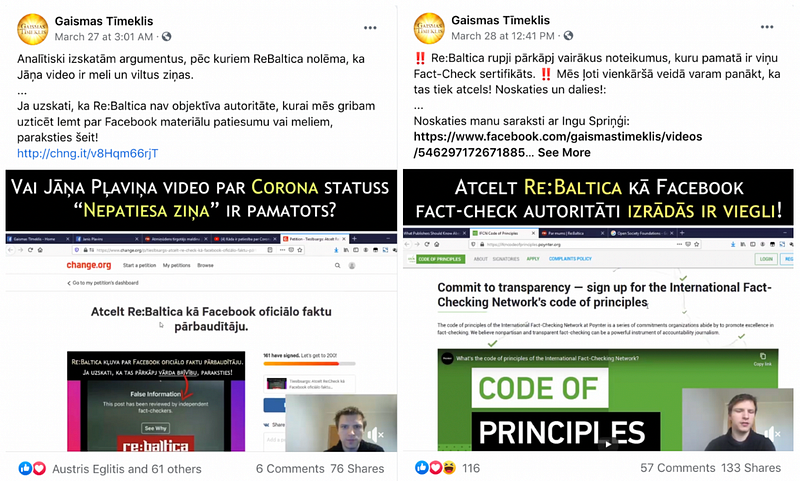
Plavins, in reply to Re:Check’s debunk, called for Springe to join an online discussion; when she “did not show up,” he announced that Re:Check’s partnership with Facebook should be terminated as a result.
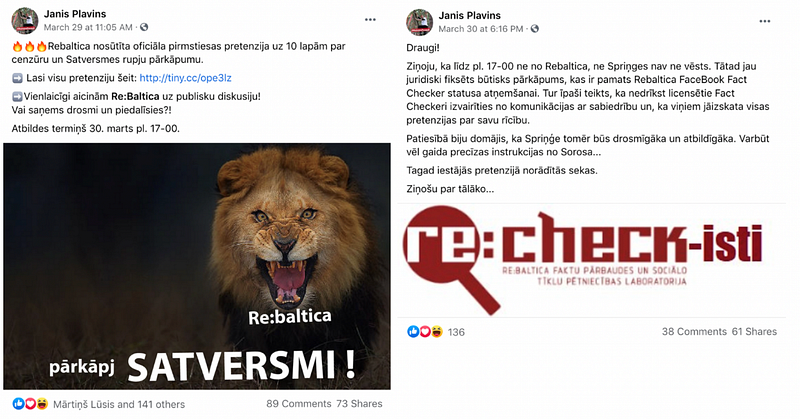
On April 2, Re:Check debunked an opinion article by a man named Artis Gulbis, a Latvian spine surgeon who criticized social distancing measures in Latvia as “irrational and panicky” and made unsupported claims that hydroxychloroquine and chloroquine can treat COVID-19. One person has already died after self-medicating with a form of chloroquine in the United States, while the efficacy of hydroxychloroquine — a drug highly promoted by U.S. President Donald Trump — remains unproven.
The article garnered over 25,600 engagements on Facebook, according to BuzzSumo, a social media listening tool.

Many Facebook pages and accounts that Re:Check caught spreading falsehoods shared Gulbis’ opinion piece. These included Aldis Gobzems, a popular Facebook page devoted to the outspoken populist Latvian parliamentarian; Marija Sils, the user account of an esoteric healing lecturer in Latvia who falsely alleges that COVID-19 is a global scheme and a bioweapon intended to promote compulsory vaccination; the account of Kristine Liepina, who has falsely suggested that COVID-19 can be prevented by a taking a cold shower and 10 pills of carbon; and the page Gaismas Timeklis, among others.
Later, Gulbis went live on Riga TV24, where he voiced his opinion once again and accused Re:Baltica of limiting free speech. Gobzems’ page called its followers to share the excerpt from the TV program “if you are not a fan of Re:Baltica.” Klimovics, Plavins, Ciekurs, Liepina, together with over 8,300 other Facebook accounts, shared the video.
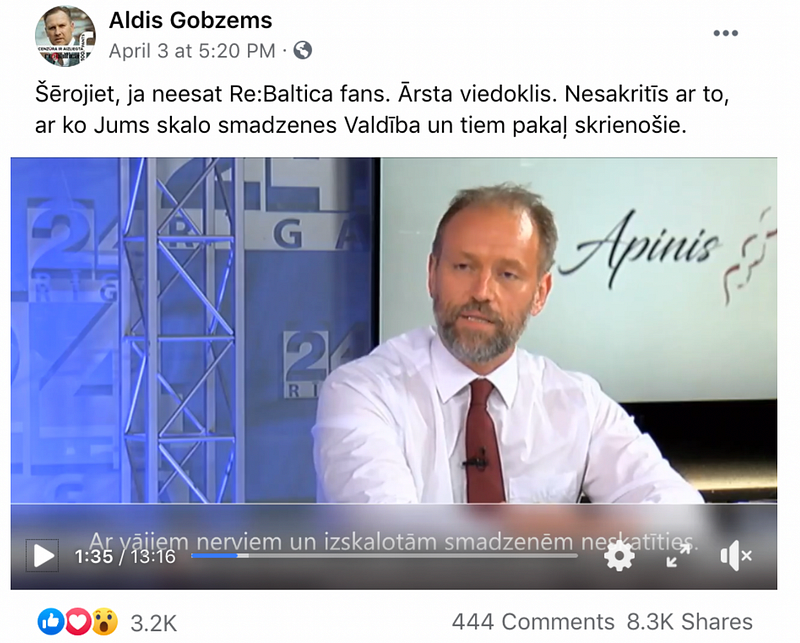
Local fact-checking outlets, even established ones like Re:Baltica with large corporate partners, continue to face resistance and even harassment from the disinformation actors they catch in the act.
After being singled out by Re:Baltica for spreading disinformation, the authors behind these false stories did not acknowledge their wrongdoing. Instead, they doubled down, escalating their false and dangerous claims to personal attacks on the fact-checkers that exposed them.
Nika Aleksejeva is a Research Associate, Baltics, with the Digital Forensic Research Lab.
Follow along for more in-depth analysis from our #DigitalSherlocks.

